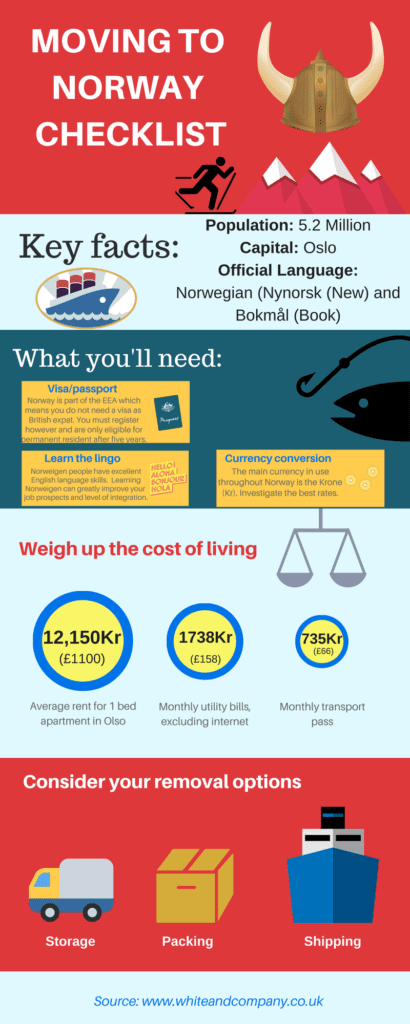Moving to Norway
Once you have taken the life-changing decision to move to Norway you will have to start thinking about how you are going to transfer your personal belongings. Finding the right removal company to take care of transferring your personal effects from the UK to Norway will therefore play a big part in your planning process.
There are several considerations, frequently overlooked by people moving overseas rather than domestically. Will all my furniture fit in my new home? Do I need to leave certain items in storage while I figure out my new property or seek temporary rental accommodation?
Choosing White & Company, will ensure you are not only using a company that meets the highest standards within the removals industry but also has the necessary expertise and skill. Plus, we can supply packing and storage solutions, to meet the demands of your move.
As founder members of BAR, FIDI & OMNI, we have successfully moved thousands of people all over the globe. Whether we transport your personal belongings by sea or road, we can help take the stress out of your move.
Why Move to Norway?
The country is referred to as the ‘land of midnight sun’. This is due to a bizarre natural phenomenon in which the sun doesn’t set for 76 days during the Summer months . Norway is an awe-inspiring splendour of steep-sided fjords, rocky coastal towns and permanent sunsets.
It’s not just Norway’s unique position in the northern hemisphere that has garnered the country a reputation as being one of the most liveable destinations in the world. Norway has recently emerged as an economic powerhouse, in large part down to smart investments in oil production and hydroelectric power.
The strong economy and jobs market is backed up by strong democratic principles. Plus, free education and some subsidised medical services are available to all its citizens. A strong onus on gender equality makes Norway incredibly family friendly also, with paid paternity leave split evenly between the sexes.
Norway’s sparse population and natural environment also make it an excellent place to raise a family. From camping under orange-tinged skies in the summer to skiing mountains under the Northern lights in the winter. The word ‘ski’ is in fact itself Norwegian, meaning ‘piece of wood’. Children grow up learning the sport from a young age, often before they can even fully walk!
Those moving to Norway can expect both a high standard of living and excellent opportunities to work and socialise.
One complaint levelled by both locals and expats alike however is the inability to save money. The very high cost of living and accommodation makes it hard to save. For the extended hours of sunlight in the summer months, you can also expect reduced daylight in the winter.
In exchange for high taxes and social contributions you can enjoy a clean and incredibly well organised country with a very low crime rate. All of which is making Norway an increasingly popular expat destination for families with children looking for a safe and exciting new environment.
Visas
As the UK is no longer a member of the European Union, Nationals of non-EU/EEA countries who want to work in Norway or to stay for longer than 90 days need a residence permit.
Residency permits will fall under one of these categories: family immigration, work immigration, study, au pair, and permanent residence.
For further information and how to apply for permits can be found by visiting the Royal Norwegian Embassy website.
Finding work
More than 10,000 Brits live and work in Norway, many in the country’s vital energy industries. Large multinationals with headquarters in Norway have been known to hire expats and so this is probably a very good starting point.
Norwegians have an excellent command of the English language as a second language. However, learning Norwegian would be highly advantageous in terms of both social integration and securing the best paid jobs outside of prearranged work placements.
Currently there are vacancies in the education and teaching, healthcare, nursing agriculture, engineering, building and construction sectors.
Below is a list of some helpful job sites to aid you in your search:
Property
Surprisingly, Foreigners don’t face any restrictions at all buying Property in Norway.
If you plan to emigrate to Norway and have your residence permit, you can buy right away. Even someone looking for a second home in Europe without obtaining Norwegian citizenship can also purchase a property.
In Norway, the real estate agent represents both the seller and the buyer. This fee is typically shouldered by the buyer.
Property is very expensive and both rental and purchase costs vary from city to city.
As a guide, to rent a 3-bedroomed home in a city centre such as Oslo, the capital, you can expect to pay an average of Kr 22,674 (£1,913) per month. Outside the city, this drops to Kr 18,134 (£1,530).
If you purchase an apartment in the city centre you would currently pay approximately Kr 95,020 (£8,019) per square metre. On the outskirts, this drops to Kr 70,166 (£5,922).
Despite the high cost, Norway boasts one of the highest levels of home ownership in Europe, with almost 80% of Norwegians owning rather than renting.
Schools
Public education is Norway is free for all children between the ages of seven and sixteen as long as you are a Norwegian citizen or a legal resident.
The Norwegian school system is divided into three parts, starting with elementary school (Barneskole, ages six to 13), lower secondary school (Ungdomsskole, ages 13 to 16), and finally upper secondary school (Videregående skole, ages 16 to 19). The marks they achieve in Ungdomskkole will determine whether they are accepted into their high school of choice.
Norwegian’s are very well educated with a high proportion of the country holding Masters level degrees. The main structure is a ‘3+2+3 model’, which works out as a three-year bachelor‘s degree, two-year master‘s degree and a three-year doctoral programme.
There are very few international or private schools in the country. However, there are a number in Oslo. These schools offer the International Baccalaureate (IB), although there are also French- and German-curriculum schools and those which offer the British IGSCE at middle school level.
Fees for international schools are often hugely expensive and spaces limited. You will need to apply as early as possible to ensure a place for your child.
The following site has some useful information regarding education in Norway:
www.lifeinnorway.net/education-in-norway/
www.expatarrivals.com/norway/education-and-schools-in-norway
Contacting White & Company
For further information on our removals service to Norway, or any other international destination, contact our international office on 01489 858678. Alternatively complete the form below with your details and we will contact you.
Public Transport
Norway’s public transport systems are generally run to a high-standard and although not cheap, they certainly work out cheaper than owning a car as fuel prices are high.
Public transport in, and around cities is well developed and extremely efficient. Transport consists of trains, busses and ferries, most of which are timed to link with each other.
Even the most remote destinations have viable transport links with the world-at-large, and for those who live there this is important confirmation that they are part of the greater community.
Driving
Any driving licence issued in any European country is valid in Norway as long as it is valid in the issuing country. A foreign driving licence does not entitle the holder to drive a car in Norway until the age of 18 years old.
Below are some general tips for driving in Norway:
Driving is on the right-hand side
Speed limits vary from 30kph to 90kph depending on whether you are driving in a residential area or an expressway.
Do not drink and drive — only 0.1 milligrams of alcohol is allowed, whereas in the UK it is 0.4 milligrams
Be aware of wildlife — sheep and reindeer and elks are almost always present on or near the country and busier main roads.
All cars must be fitted with studded or special tyres designed for winter.
For further information, the RAC has a very good web site with great tips and advice for Brits driving in Norway:
Healthcare
Per head, Norwegian expenditure on healthcare is the highest in the world. Although treatment is not free, there is an annual limit on how much any one individual must pay for healthcare.
If you are planning to work in Norway for at least a year, you automatically become a member of the Norwegian National Insurance Scheme from your first day of work. This means you must pay Norwegian national insurance contributions in order to be entitled to its services and benefits.
If you plan to stay for less than a year you should ensure that you have adequate health insurance cover before you arrive in Norway, which while costly is worth taking.
Below are some web sites with further information on healthcare provision in Norway:
www.lifeinnorway.net/healthcare/
legemiddelverket.no/english/about-us
Currency Conversion
When relocating to another country with a different country making sure you get the best exchange rate is pivotal to starting your new life on the right foot and can even be the difference between landing your dream home and not.

White & Company
Providing European Removals since 1871
We recommend either a personal visit, or a virtual survey be undertaken by one of our Surveyors for all European moves so that we can assess your requirements, and the volume of goods to be moved.
Below is a guide to the largest cities in Norway:
Allesund
Bergen
Drammen
Fredrikstad
Kristiansand
Oslo
Sandnes
Stavanger
Tromso
Trondheim










